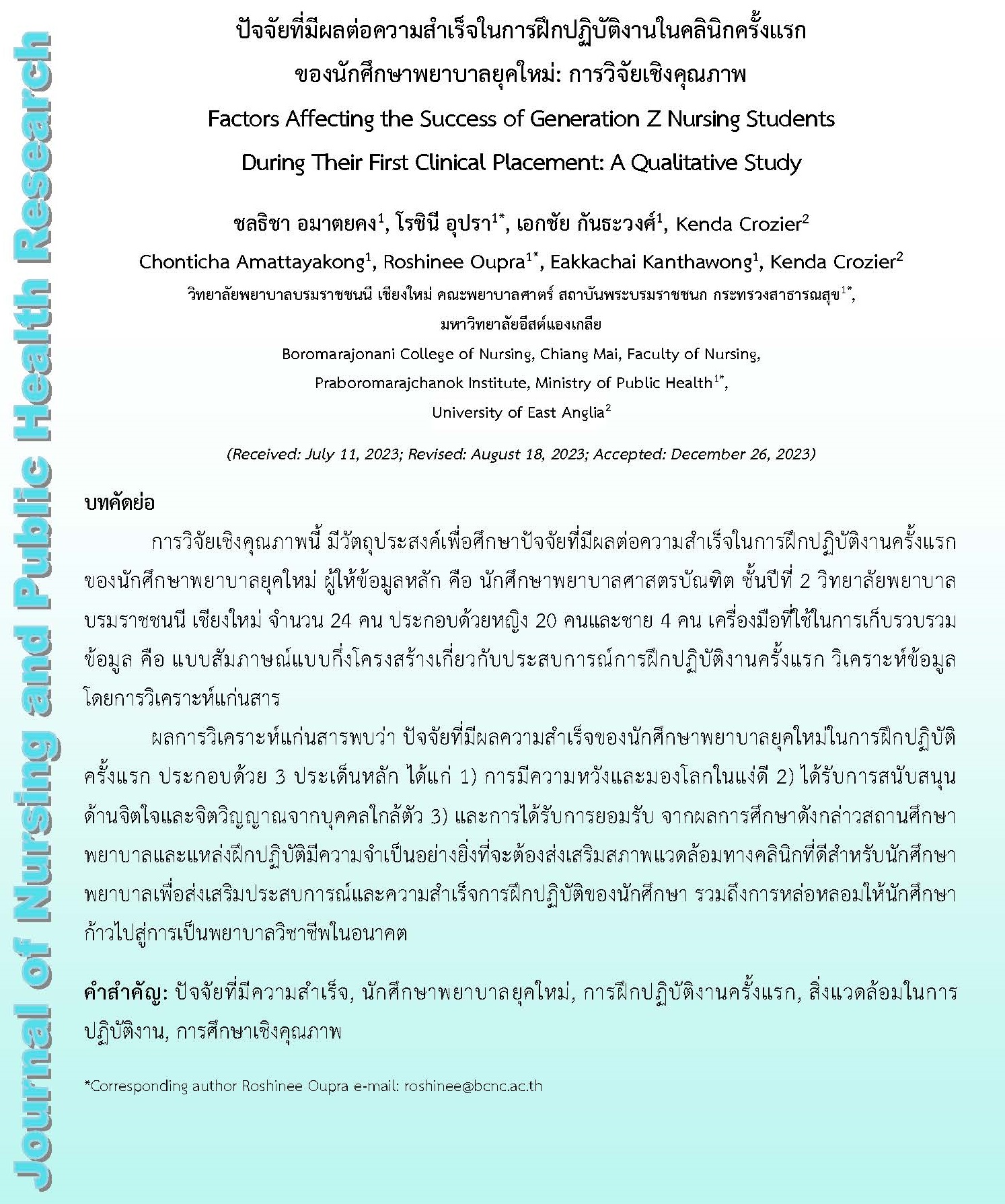Factors Affecting the Success of Generation Z Nursing Students During Their First Clinical Placement: A Qualitative Study
Keywords:
Factors Affecting the Success, Generation Z Nursing Students, The Frist Nursing practice, Clinical Environment, Qualitative ResearchAbstract
The objective of this qualitative study was to explore factors related to factors affecting the success of generation Z nursing students during their first clinical placement. The key informants were undergraduate second-year nursing students at Boromarajonani College of Nursing, Chiang Mai, comprising 20 females and 4 males. The research instrument was a semi-structured interview regarding the experiences and views on clinical placements of generation Z nursing students during their first clinical placement. The data were analyzed by thematic analysis.
The results from thematic analysis showed that factors affecting the success of generation Z nursing students during their first clinical placement included three themes: 1) being hopeful and self-optimistic; 2) receiving mental and spiritual support from surrounding people; and 3) experiencing trustworthy. The findings demonstrate that it is imperative for nursing schools and clinical placements to provide nursing students with a positive and supportive environment in which to study and gain experience. This will enhance their academic success and enable them to become registered nurses in the future.
References
Allen, E. (2021). Supporting the generation Z nursing student in professional identity formation. Retrieved May 12, 2023 from https://www.ajj.com/sites/default/files/fall2021.
Amattayakong, C., Klunklin, A., Kunawiktikul, W., Kuntaruksa, K., & Turale, S. (2020). Wellness among nursing students: A qualitative study. Nurse Education in Practice, 48, 102867. https://doi.org/10.1016/j.nepr.2020.102867
Anderson, C., Moxham, L., & Broadbent, M. (2016). Providing support to nursing students in the clinical environment: A nursing standard requirement. Contemporary Nurse, 52(5), 636-642. https://doi.org/10.1080/10376178.2016.1215774
Atakro, C. A., et al. (2019). Clinical placement experiences by undergraduate nursing students in selected teaching hospitals in Ghana. BMC Nursing, 18, 1. https://doi.org/10.1186/s12912 018-0325-8
Baldwin-White, A. J. M., Kiehne, E., Umaña-Taylor, A., & Marsiglia, F. F. (2017). In pursuit of belonging: acculturation, perceived discrimination, and ethnic-racial identity among Latino youths. Social Work Research, 41(1), 43–52. https://doi.org/10.1093/swr/svw029
Barrett, D. & Harris, M. (2020). Nurse educators must demonstrate care, competence and integrity to enhance students' trust in them. Evidence-Based Nursing, 23(2), 46. https://doi.org/10.1136/ebnurs-2018-103042
Brown, J., et al. (2021). Nursing students’ academic success factors: A quantitative cross sectional study. Nurse Educator, 46(2), E23-E27 https://doi.org/10.1097/nne.0000000000000882
Chicca, J. & Shellenbarger, T. (2018). Connecting with generation Z: Approaches in nursing education. Teaching and Learning in Nursing, 13, 180-184. https://dli.org/10.1016.j.teln.2018.03.008
Creswell, J. (2008). Research design: Qualitative, quantitative and mixed methods approaches (3rd ed.). Thousand Oaks, CA: Sage Publications.
Flott, E. A. & Linden, L. (2016). The clinical learning environment in nursing education: A concept analysis. Journal of Advanced Nursing, 72(3), 501-513. https://doi.org/10.1111/jan.12861
Gaberson, K. B., Oermann, M. H., & Shellenbarger, T. (2015). Clinical teaching strategies in nursing. New York, NY: Springer.
Graneheim, U. H. & Lundman, B. (2004). Qualitative content analysis in nursing research: Concepts, procedures and measures to achieve trustworthiness. Nurse Education Today, 24(2), 105-112. https://doi.org/10.1016/j.nedt.2003.10.001
Gray, J. R. (2017). Qualitative Research Methods. In J. R. Gray, S. K. Grove, & S. Sutherland (Eds.), Burns and Grove's the practice of nursing research: Appraisal, synthesis, and generation of evidence (8th ed.). St. Louis, Missouri: Elsevier.
Hashemiparast, M., Negarandeh, R., & Theofanidis, D. (2019). Exploring the barriers of utilizing theoretical knowledge in clinical settings: A qualitative study. International Journal of Nursing Sciences, 6(4), 399-405. https://doi.org/10.1016/j.ijnss.2019.09.008
Holloway, I., & Wheeler, S., (2013). Qualitative research in nursing and healthcare, 3rd. New Jersey, United States: Wiley-Blackwell.
Holloway, I. & Galvin, K. (2016). Qualitative research in nursing and health care, 4th. New Jersey, United States: Wiley-Blackwell.
Jafarian-Amiri, S. R., Zabihi, A., & Qalehsari, M. Q. (2020). The challenges of supporting nursing students in clinical education. Journal of Education and Health Promotion, 9, 216. https://doi.org/10.4103/jehp.jehp_13_20
Johansen, M. L. & O' Brien, J. L. (2016). Decision making in nursing practice: A concept analysis. Nursing Forum, 51(1), 40–48. https://doi.org/10.1111/nuf.12119
Kupcewicz, E., Mikla, M., Kadučáková, H., Schneider-Matyka, D., & Grochans, E. (2022). Health behaviours and the sense of optimism in nursing students in Poland, Spain and Slovakia during the COVID-19 pandemic. International Journal of Environmental Research and Public Health, 19(4), 2388. https://doi.org/10.3390/ijerph19042388
Lobo, C., Paul, R., & Crozier, K. (2021). Collaborative learning in practice: Coaching to support student learners in healthcare. John Wiley & Son, Ltd.
Marć, M., Bartosiewicz, A., Burzyńska, J., Chmiel, Z., & Januszewicz, P. (2019). A nursing shortage a prospect of global and local policies. International Nursing Review, 66(1), 9-16. https://doi.org/10.1111/inr.12473
Morse, J, M. & Niehaus, L. (2016). Mixed method design principle and procedure. Routledge.
Pålsson, Y., Mårtensson, G., Swenne, C. L., Ädel, E., & Engström, M. (2017). A peer learning intervention for nursing students in clinical practice education: A quasi-experimental study. Nurse Education Today, 51, 81–87. https://doi.org/10.1016/j.nedt.2017.01.011
Russ, D. Whiteing, N. Aggar, C. (2023). An integrative review of nursing students’ clinical placement experiences throughout their nursing degrees. Collegian, 30(1), 154-162. https://doi.org/10.1016/j.colegn.2022.07.002
Schmitt, C.A. & Lancaster, R.L. (2019). Readiness to practice in Gen Z Nursing Students. Journal of Nursing Education, 58(10), 604-606. https://doi.org/10.3928/01484834-20190923-09
Torbjørnsen, A., Hessevaagbakke, E., Grov, E. K., & Bjørnnes, A. K. (2021). Enhancing students learning experiences in nursing programmes: An integrated review. Nurse Education in Practice, 52, 103038. https://doi.org/10.1016/j.nepr.2021.103038
van Dyk, E. C., van Rensburg, G. H., & van Rensburg, E. S. J. (2021). A model to foster and facilitate trust and trusting relationships in the nursing education context. Health SA=SA Gesondheid, 26, 1645. https://doi.org/10.4102/hsag.v26i0.1645
Varagona, L. M. & Hold, J. L. (2019). Nursing students' perceptions of faculty trustworthiness: thematic analysis of a longitudinal study. Nurse Education Today, 72, 27-31. https://doi.org/10.1016/j.nedt.2018.10.008
Willis, L. (2023). Shape of caring: A review of the future education and training of registered nurses and care assistants. Retrieved January 12, 2023 from https://www.nmc.org.uk/news/press-releases/2015/shape-of-caring-review-publishes finalrecommendations/.
World Health Organisation. (2020). State of the world’s nursing 2020: Investing in education, jobs and leadership. Retrieved August 10, 2023 from https://www.who.int/publications/i/item/9789240003279.

Downloads
Published
How to Cite
Issue
Section
License
Copyright (c) 2023 Journal of Nursing and Public Health Research

This work is licensed under a Creative Commons Attribution-NonCommercial-NoDerivatives 4.0 International License.
1. บทความหรือข้อคิดเห็นใด ๆ ที่ปรากฏในวารสารวิจัยการพยาบาลและการสาธารณสุข ที่เป็นวรรณกรรมของผู้เขียน บรรณาธิการไม่จำเป็นต้องเห็นด้วย
2. บทความที่ได้รับการตีพิมพ์ถือเป็นลิขสิทธิ์ของ วารสารวิจัยการพยาบาลและการสาธารณสุข








